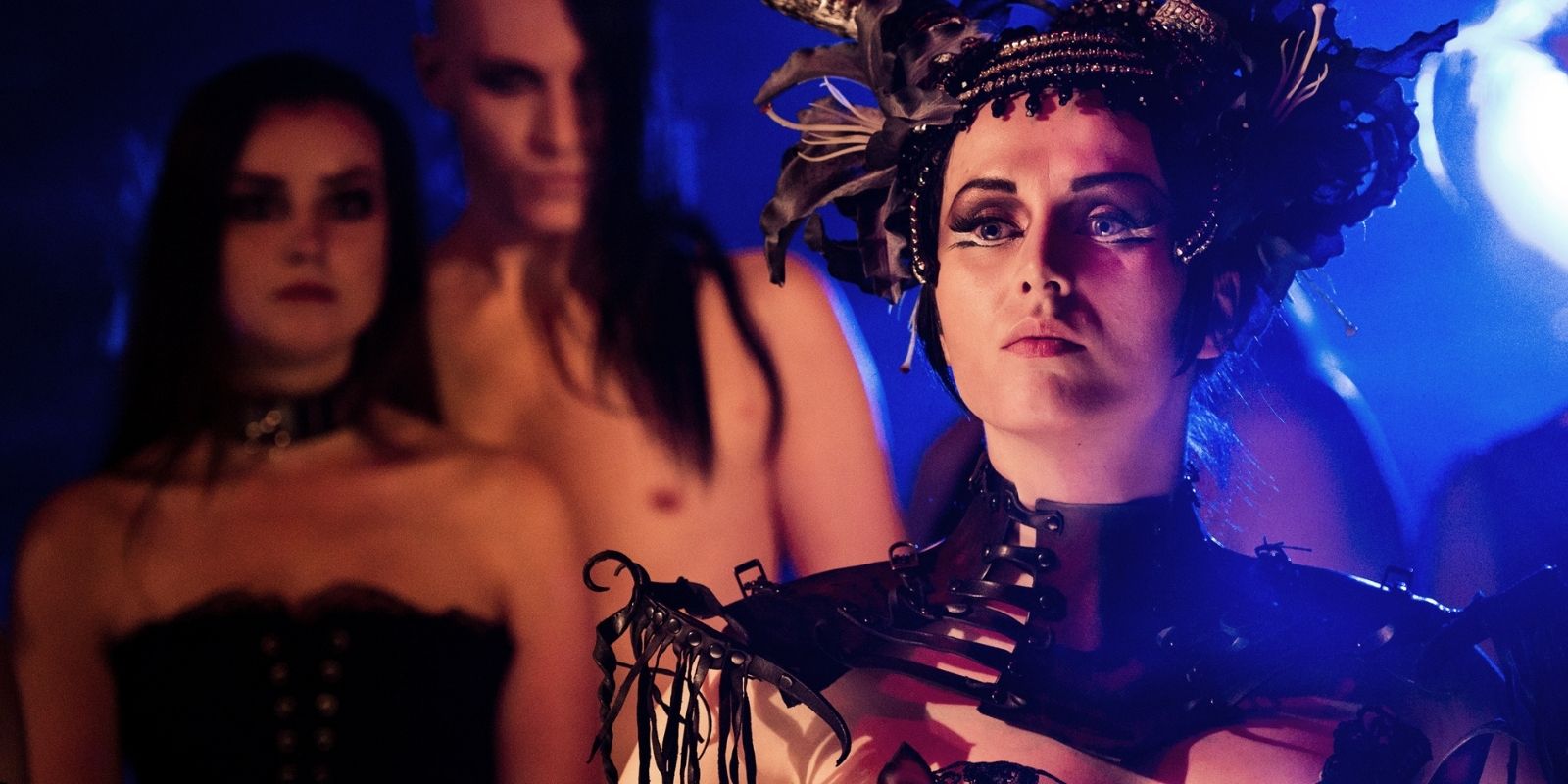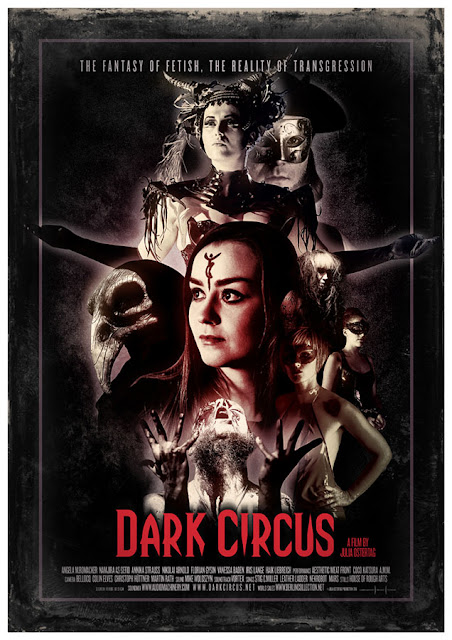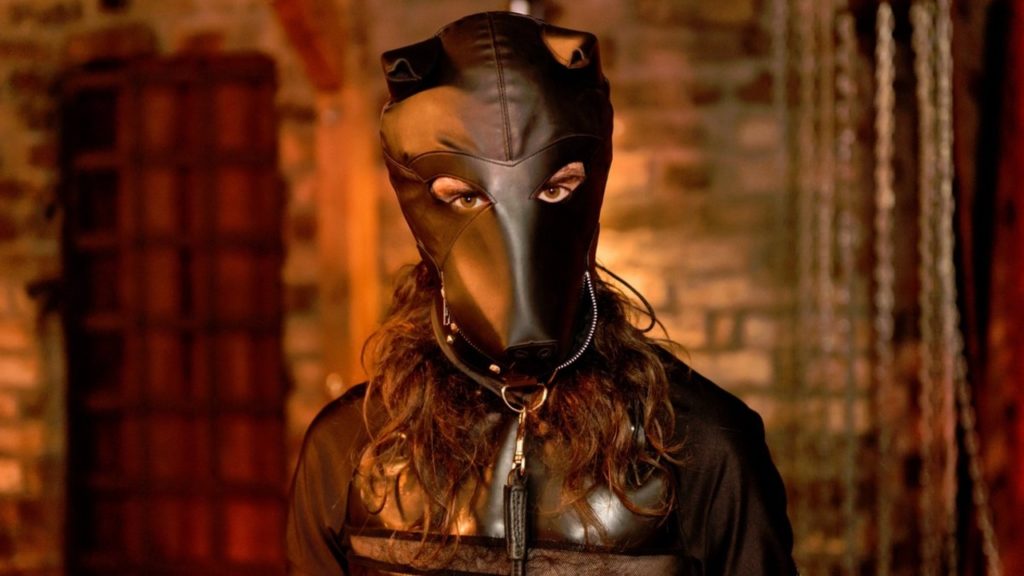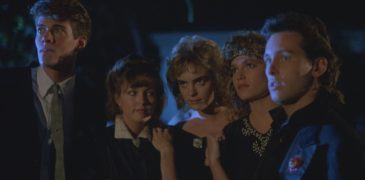
Johanna is just twenty years old but struggling with her boring and aimless existence. Disturbing visions start the day she gets fired from her job. Soon Johanna is carried off into a different world beneath the city where people live in a parallel universe full of darkness and magic rituals. The denizens of this world are inspired and guided by a mysterious woman, The Mistress. Drawn into her cult through an extravagant initiation ceremony, Johanna encounters fascinating characters: People like Simon, the collector, with whom she embarks on an obsessive affair. As Johanna plunges deeper into the occult her old world slowly collapses…

There are some productions that exist as a celebration of a certain sub-culture, a way to showcase the attributes that those involved find worthy of further exploration. However, the inherent fault in such an approach is to realize, after the fact, that the subculture you embrace is seen as unremarkable from the outside. Julia Ostertag’s Dark Circus certainly falls into the latter pitfall, yet it is not without it redeeming qualities.
Notably, and showcasing the exquisite fashion of the scene, the costume design in Dark Circus is stylish and sensual. Fetish gear is mixed with costumes to capture that sense of the occult and Johanna’s own sexual and spiritual awakening. In addition, the set designs are wonderfully macabre either filled with art or bodies writing to capture a constant sense of a living/expansive environment. If anything can be said in favor of the production, it exists as a consistent vision steeped in its own lore through design alone.
The other productions’ admirable attribute comes from its unapologetic embrace of sexuality, both in its display of nudity and BDSM culture. There is a lot of tits, and there is a slot of sub/dom play in the film, but it is all represented in a dizzying abundance that keeps the tone of the film in the fantastical – ideal when framed as the re-awaking of Johanna.

Story wise, the film presents itself as a sexual rebirth of Joanna, and an embracing of the occult. Unfortunately, this is where the film will begin to unravel for most, as the transformation is slow paced and can’t seem to shake the vibe of still trying to present the subculture as the pinnacle of ‘cool’. A story as old as time told to much greater effect, the sexual awaking of Johanna is much more tepid than Dark Circus makes it out to be – attempt at shock or sensationalism becoming lost in the noise of the sets and characters. Sadly, there is not much reason to feel invested in Johanna, and the project can’t shake the vibe of trying to show off a certain cub-culture over crafting an engaging narrative. Tragically, this also buries any of the performances and makes the weak ones even more pronounced, but this is always a problem when you hire friends over actual actors.
Approaching a film so heavily steeped in a certain sub-culture, it feels dishonest to critique it without mentioning my own personal bias with said group. Growing up as a kid and being overtly obsessed with the German goth scene, particularly through music, it is no longer a sub-culture that I really equate with high artistic standards, yes art and style is subjective but to me it was something I ‘grew out’ of (personal reflection not condemnation). Furthermore, any variant of BDSM has never been a personal interest of mine. As such, while I could admire the eroticism in these scenes as a man who likes nudity, the actual sex play to me was awkward at best and downright silly at its worse (pup-play is something I can’t take seriously).
To say my own personal tastes were not a direct factor on whether I enjoyed the film or not is very present in a production of this ilk. Conversely, I can see people who are into BDSM and goth aesthetic to find a lot here to adore and get lost in. This film was objectively, not for me, yet, if anything covered here tickles your fancy I implore you to check it out. Ultimately, Julia Ostertag has crafted a unique vision rooted in her love of German counter-culture.

We Watched Dark Circus Courtesy of Midori Impuls

More Film Reviews
A teenage runaway takes part in a sleep study that becomes a nightmarish descent into the depths of her mind and a frightening examination of the power of dreams. Have… With the turn of a new decade, new opportunities were sought by film studio Daiei. In 1970, Daiei on the verge of bankruptcy, entered into a partnership with fellow struggling… We previously had the chance to check out Thomas Burke’s short film Camping Fun, a quick dive into a small cult that showed that Burke had the knack to channel… Almost entirely free of dialogue, Looky-loo (2024) gives viewers the view from a killer’s own eyes as he stalks and plans multiple murders. The nameless killer, gains confidence with each… Khavn De La Cruz, or simply Khavn, is a Filipino director best known for his 2010 crime comedy film Mondomanila. His works never cease to emanate with his knack for… Waxwork (1988), Anthony Hickox’s directorial debut, is a half-baked comedy horror film with a tedious build-up, unmemorable characters, confusing lore, and a long-overdue payoff. Although it already fell at the…Come True (2021) Team Film Review – Beware the Shadows
Island of Horrors (1970) Film Review – Surviving Decapitation Island
SHC: Freak Accident (2022) Short Film Review – I’m Burning Up!
Looky-loo (2024) Film Review – Through the Eyes of A Killer [Unnamed Footage Festival 7]
Three Days Of Darkness: Zero (2005) Film Review – Let Darkness Swallow You Whole
Waxwork (1988) Film Review – As it Waxes Nostalgic



![Looky-loo (2024) Film Review – Through the Eyes of A Killer [Unnamed Footage Festival 7]](https://www.grimoireofhorror.com/wp-content/uploads/2024/03/Look-Loo-2023-review-365x180.jpg)

